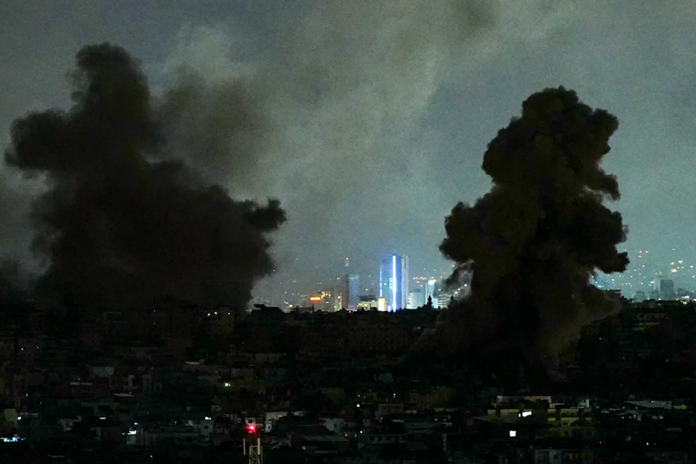Israel and Lebanon have agreed to the terms of a ceasefire agreement to end the Israel-Hezbollah conflict, a senior U.S. official told Axios on Monday. The parties have not yet announced an agreement.
Why it matters: More than 3,500 Lebanese have been killed and more than 15,000 injured in more than a year of fighting. The agreement would also allow hundreds of thousands of civilians on both sides of the border to gradually return home.
- The Israeli Security Cabinet is expected approve the deal on Tuesday, the U.S. official said. An Israeli official confirmed the cabinet would convene Tuesday.
- “We think we have a deal. We are on the goal line but we haven’t passed it yet. The Israeli cabinet needs to approve the deal on Tuesday and something can always go wrong until then,” the U.S. official said.
- Four U.S. and Israeli officials told Axios on Sunday that the deal was nearly final. White House spokesperson John Kirby told reporters Monday “we are close.”
Driving the news: The draft ceasefire agreement includes a 60-day transition period during which the Israeli military would withdraw from southern Lebanon, the Lebanese army would deploy in areas close to the border and Hezbollah would move its heavy weapons north of the Litani River.
- The deal includes a U.S.-led oversight committee to monitor implementation and address violations.
- The U.S. has agreed to give Israel a letter of assurances that includes support for Israeli military action against imminent threats from Lebanese territory, and for action to disrupt things like the reestablishment of a Hezbollah military presence near the border or the smuggling of heavy weapons, Israeli and U.S. officials say.
- Under the agreement, Israel would take such action after consultations with the U.S., and if the Lebanese military did not deal with the threat.
Flashback: The fighting began after Hezbollah fired rockets into Israel on Oct. 8, 2023, and escalated significantly after Israel launched a ground invasion of Lebanon on Oct. 1, 2024.
- Most of the casualties have come on the Lebanese side of the border, though around 140 Israeli soldiers and civilians have been killed.
Behind the scenes: The agreement was nearing completion last Thursday when the International Criminal Court issued arrest warrants against Israeli Prime Minister Benjamin Netanyahu and his former defense minister, Yoav Gallant, U.S. and Israeli officials say.
- The news came while Netanyahu was meeting with U.S. envoy Amos Hochstein, who has been mediating for a year between Israel and Lebanon.
- Netanyahu was outraged, and grew even more angry after the French Foreign Ministry announced that France would implement the court’s ruling.
- That threw a wrench into the negotiations, as Lebanon had wanted France to be part of the oversight committee to monitor implementation of the agreement.
On Friday, Biden spoke to French President Emmanuel Macron to try to solve the problem.
- A U.S. official said Biden told Macron that Netanyahu was right to be angry, and that it was not possible to mediate a deal while also pledging to arrest the head of state of one of the parties.
- Macron told Biden he wanted to help but that his Foreign Ministry was only making clear its legal obligations towards the ICC. The French issued second statement to try to tamp down the tensions.
- On Saturday, Hochstein sent a message to Netanyahu through Israeli Ambassador to Washington Mike Herzog in which he threatened to withdraw as mediator if Israel did not move towards a deal in the coming days, according to a source familiar with the matter.
Update: The crisis was resolved in the last 24 hours, the U.S. official said on Monday. France agreed to take steps to improve relations with Israel, and Israel agreed that France could have a role in the implementation of the deal.
- A French official said Macron and Netanyahu spoke about the ICC warrants on Friday after the Biden-Macron call, but that Macron did not make any commitments to Netanyahu.
The latest: Netanyahu held a meeting about the ceasefire talks on Sunday that included several senior ministers and intelligence chiefs, Israeli officials say.
- A decision was taken to move towards the agreement, according to one senior Israeli official, who said an announcement could come this week.
- A second Israeli official who attended the meeting said “the direction is positive” but that several issues remained unresolved.
- Two senior U.S. officials with direct knowledge of the issue said on Sunday that the parties were getting close to a deal, but it was not completed.
What’s next: On Monday, the Pentagon’s top Middle East policy official, Dan Shapiro, will arrive in Israel and meet with Defense Minister Israel Katz and other Israeli officials.
- Biden’s top Middle East adviser Brett McGurk “will visit Saudi Arabia on Tuesday and discuss using the potential of a ceasefire deal in Lebanon as a catalyst for a potential Gaza ceasefire and a return of hostages and increased stability in the region,” White House deputy press secretary Andrew Bates said in a briefing with reporters.
By Barak Ravid – axios

